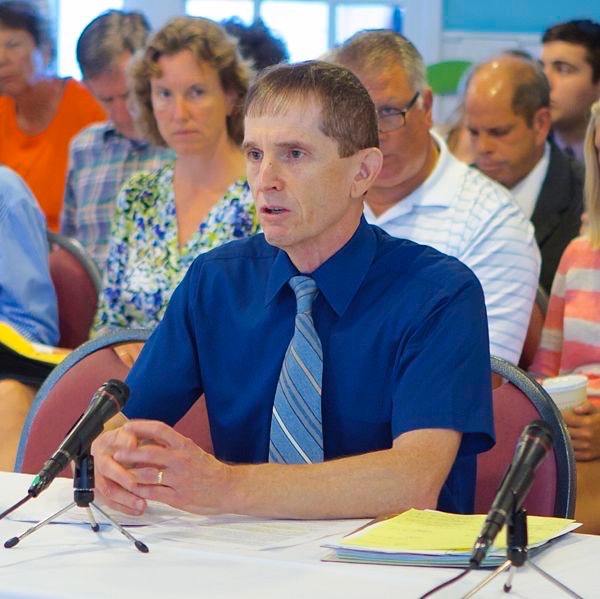Archive
NJ Gov. Murphy’s Public Access Law Guts The Public Trust Doctrine
Legislation Severely Narrows Historic Legal Doctrine That Provided Broad Public Rights
[Update below]
NJ Governor Murphy just signed legislation (S-1074 [4R] – P.L. 2019, c.81) that literally guts a magnificent legal doctrine that provided broad public rights, dating back to the Roman Empire.
The fact that this debacle is being reported by media and praised by some coastal groups as a move that “strengthens public access” is an outrage beyond Orwell, and an illustration of, at best, gross incompetence if not downright malfeasance.
Let me back that harsh criticism up.
The Murphy law severely narrows and weakens the Public Trust Doctrine, a legal doctrine that preceded The Magna Carta, considered the foundation of western law:
“the greatest constitutional document of all times – the foundation of the freedom of the individual against the arbitrary authority of the despot”.[4]
The Public Trust Doctrine is similarly a foundational doctrine. As elucidated in the NJDEP Handbook (emphases added)
Public rights of access to and use of the tidal waterways and their shores, including the ocean, bays, and tidal rivers, in the United States predate the founding of this country. The rights are based in the common law rule of the Public Trust Doctrine. First codified by the Roman Emperor Justinian around 500 AD as part of Roman civil law, the Public Trust Doctrine establishes the public’s right to full use of the seashore as declared in the following quotation from Book II of the Institutes of Justinian:
“By the law of nature these things are common to all mankind – the air, running water, the sea, and consequently the shores of the sea. No one, therefore, is forbidden to approach the seashore, provided that he respects habitations, monuments, and the buildings, which are not, like the sea, subject only to the law of nations.”
Influenced by Roman civil law, the tenets of public trust were maintained through English Common Law and adopted by the original 13 colonies, each in their own form. The grants that form the basis of the titles to private property in New Jersey never conveyed those public trust rights, which were reserved to the Crown. Following the American Revolution, the royal rights to tidal waterways and their shores were vested in the 13 new states, then each subsequent state, and have remained a part of law and public policy into the present time. Tidal waterways and their shores always were, and remain, subject to and impressed with these public trust rights.
Under longstanding legal and governing principles, fundamental individual and collective public legal rights, “natural rights”, such as Constitutional rights to free speech, religion and assembly, are not to be subject to the “laws of nations” and must not be allowed to be stripped by majorities and narrowed by Legislation. (Wiki)
Natural and legal rights are two types of rights. Natural rights are those that are not dependent on the laws or customs of any particular culture or government, and so are universal and inalienable(they cannot be repealed by human laws, though one can forfeit their enforcement through one’s actions, such as by violating someone else’s rights.) Legal rights are those bestowed onto a person by a given legal system (they can be modified, repealed, and restrained by human laws).
That’s why the First Amendment prohibits Congress from enacting laws to limit fundamental rights:
Congress shall make no law respecting an establishment of religion, or prohibiting the free exercise thereof; or abridging the freedom of speech, or of the press; or the right of the people peaceably to assemble, and to petition the Government for a redress of grievances.
Could you imagine the furious reaction if President Trump and Congress attempted to pass a law to limit the people’s First Amendment rights to free speech, religion or assembly?
So, by definition, the mere fact that Governor Murphy and the NJ Legislature enacted statutory law to limit the scope and weaken the protections of this magnificent doctrine is a HUGE setback.
I tried to explain the origin of this debacle in these posts:
Summarizing what went so wrong:
1. The Christie DEP adopted Public Access regulations that repealed and weakened prior rules adopted by the Corzine DEP. Among other things, the Christie rules abdicated State responsibility and delegated State public trust obligations to voluntary local controls.
2. Coastal groups NY/NJ Baykeeper & Hackensack Riverkeeper filed an extremely ill-advised and poorly argued lawsuit against the Christie DEP rules.
They were represented by the law firm of Pringle, Quinn, Anzano, P.C. Just a glance at that firm’s Environmental Law practice area reveals an overwhelming pro-development focus.
To understand the implications of this, it would be as if a so-called “pro-choice” women’s group challenged a State law restricting abortion rights and were represented by lawyers from The Thomas More Society.
There’s also good reason to believe that the Christie Administration – no friend of DEP power to regulate private property for public benefit – also poorly argued and weakly defended DEP authority to enforce the Public Trust Doctrine. In other words, they may have thrown the case.
3. The Appellate Division issued a devastatingly bad decision in 2015 (read it here), which concluded:
Case law that has developed regarding the public trust doctrine, including those which have expanded its reach to privately-owned property, do not support DEP’s contention that the Legislature implicitly delegated regulatory powers to the agency. DEP was not authorized to promulgate the Rules under the public trust doctrine.
4. The decision was appealed, but the NJ Supreme Court declined to hear the case.
5. The Legislature then began considering legislation to respond to the Appellate Division’s decision.
6. The legislation passed and signed into law by Gov. Murphy severely narrows the historic Public Trust Doctrine.
The Murphy law is even narrower and weaker than the Corzine DEP regulations that were rolled back by the Christie DEP rules that were struck down by the Court.
I challenge anyone to do a line by line review of the Murphy law and the Corzine DEP rules and reach a contrary conclusion (just one example: the Corzine DEP rules required that where it was not feasible to provide on-site pubic access (e.g. a refinery), then landowners had to contribute to a fund or otherwise provide offsite public access).
Even the sponsor of the legislation admits this: (NJ Spotlight)
The law addresses business concerns about opening up access to critical infrastructure along waterfront areas, such as nuclear power plants, tank terminals and refineries that could be targeted by terrorists.
A more controversial issue concerns whether those facilities ought to be required to allow off-site access to waterfront areas when those sites are precluded because of security concerns. That question and other more contentious issues have been put off but are expected to be addressed in a second bill, according to Sen. Bob Smith (D-Middlesex), who sponsored the bill signed by the governor.
For Tim Dillingham of ALS to support this and for NJ Spotlight to describe this as “strengthening of public access” is sham.
But it could be even worse than sham.
Dillingham just received another $1 million grant from the Murphy DEP. According to DEP:
-
The American Littoral Society, $1 million for a living shoreline and oyster reef project to improve water quality along Forked River Beach;
Just 2 days after DEP’s announcement of that $1 million grant, Dillingham was quoted in Gov. Murphy’s press release praising the Gov. for signing the public access law:
“We thank Governor Murphy for signing this important legislation. It will strengthen the protection of the public’s rights to get to and enjoy NJ’s beaches and waterfronts,” said Tim Dillingham, Executive Director of the American Littoral Society. “It will provide new tools to deal with long standing public access problems. We look forward to working with the administration to getting this law implemented and getting New Jerseyans everywhere to the waters that they have a right to enjoy.”
So, there is an obvious appearance – if not in fact – a quid pro quo.
In addition, Ed Potasnak was also was quoted in the Gov. Murphy press release:
“As we get ready for summer and the influx of tourists from around the world coming to enjoy New Jersey’s amazing 130-mile coastline, one thing remains clear, our connection to our oceans and waterways is a fundamental part of our lives, our culture, and our economy,” said Ed Potosnak, Executive Director of New Jersey League of Conservation Voters. “Today, the Governor, continuing to build on his commitment to make New Jersey a stronger and fairer state signed the Beach Access bill into law. The Beach Access Law is a win for all New Jerseyans, it’s a win for our waterways and beaches, and it’s a win for our economy. We thank Governor Murphy and the New Jersey Legislature for taking this important step.”
Potasnak is Executive Director of the NJ League of Conservation Voters.
NJ LCV endorsed candidate Murphy for Governor and spend $200,000 in support of his election during the campaign.
(Tim Dillingham of ALS is a former Board Member of NJ LCV as is Debbie Mans).
Again, another example of an appearance of a quid pro quo.
Shameful. Unethical. Perhaps worse.
[End note: for the cherry on top of this scam, consider that:
1. Debbie Mans was head of NY/NJ Baykeeper at the time of the filing of the ill advised lawsuit; and
2. Mans was on the Board of NJ LCV at the time LCV endorsed Murphy and spent $200,000 in support of his candidacy; and
3. Mans was approved by Gov. Murphy’s Office as a political appointee in the capacity of Deputy Commissioner of NJ DEP; and
4. Mans was a DEP policymaker during the negotiations of the public access bill the Gov. just signed; and
5. Mans was a policymaker at DEP when her fellow coastal colleague (who filed an Amicus in mans’s lawsuit) Tim Dillingham received a $1 million DEP grant; and
6. Mans was a policymaker at DEP when Dillingham was quoted in Gov. Murphy’s press release; and
7. Mans was a policymaker at DEP when her former NJ LCV Board member Potasnak was quoted in Gov. Murphy’s press release.
Shameful behavior.
[Update – 5/7/19 – In addition to violating the principle of legislation “authorizing” and narrowing a natural right, the legislation itself narrows the Public Trust doctrine:
1) The law narrows the scope of access – note the use of “certain”:
AN ACT concerning public access to certain public trust lands
2) DEP is delegated authority and given a “duty”:
The Department of Environmental Protection has the authority and the duty to protect the public’s right of access to tidally flowed waters and their adjacent shorelines under the public trust doctrine and statutory law.
But that “duty” is narrowed, in 3 ways –
a) “reasonable” is a vague and subjective standard:
“ensure reasonable and meaningful public access”
b) to the extent “practicable”: (a vague standard that weakened the original term “possible”):
the department has the duty to make all tidal waters and their adjacent shorelines available to the public to the greatest extent practicable”
c) the duty is limited to “protect existing public access” –
DEP does not have clear authority and a duty to expand existing public access.
3. The “necessary support amenities to facilitate public access” are specified only as “public parking and restrooms”.
“Amenities” are not defined and that term is subjective. An amenity is a luxury, not a necessity, so that is a huge difference. Does it include foot paths? Water? Shelter? Handicapped access? How much parking? What bathroom capacity? You get my point.
4. Public access is required as a condition of public funding (beach replenishment, dune maintenance, etc), but there are no standards, just a general “consistency” standard: i.e. “consistent with the public trust doctrine.” That will lead to case by case negotiation with DEP bureaucrats.
5. The exempt facilities in Section 3 (mostly for security reasons, e.g. refinery) are not required to provide compensation for and/or provide off-site public access.
6. Section 4 mandates that DEP include public access in a variety of DEP permits – but there is a huge loophole for “DEP approved municipal plans”, which DEP is required to consider:
In determining the public access that is required at a property, the department shall consider the scale of the changes to the footprint or use, the demand for public access, and any department- approved municipal public access plan or public access element of a municipal master plan.
How many municipal plans has the Christie DEP already approved?
7. There is another prone to abuse exemption and loophole for:
those permits-by-rule, general permits, and general permits-by- certification for which, consistent with the public trust doctrine, public access would not be required;
8. There is another prone to abuse exemption – “emergency conditions”
Consider this exemption in light of the fact that former DEP Commissioner Martin issued an Order that attempted to deregulate reconstruction of infrastructure after Sandy under similar “emergency” conditions:
specific categories of projects which, due to the existence of an emergency condition, or a condition that poses a significant and immediate threat to public health and safety, shall not require individual review of public access pursuant to subsection a. of this section.
9. MARINA EXEMPTION:
If no public access is provided to the waterfront and adjacent shoreline prior to application for a permit or other approval, the department shall not impose new public access requirements to the waterfront or adjacent shoreline as a condition of the permit or other approval.
10. CAFRA loophole – Small scale projects below the CAFRA threshold (24 units) are not required to provide public access. There is no cumulative impact standard or consideration of multiple small projects.
11. Loophole – Risk exemption:
any areas to be closed to public access because of permanent obstructions or risks due to hazardous operations where no reasonable measures can be taken to avert those risks;
12. Loopholes galore: what the hell does this mean?
d. The department shall consider, when determining if public access is sufficient or appropriate, the type of public access available or needed within the area, the compatibility of the proposed publicaccess with the applicant’s proposed use of the site, the square footageof the public access area, and the environmental impact or benefit of the proposed development.
13. T&E loophole:
6. (New section) The Department of Environmental Protection may restrict public access to tidal waters and adjacent shorelines to protect critical habitat areas from injurious uses, or threatened or endangered species or their habitat areas from injury or injurious uses, but only to the extent necessary according to the needs of the habitat areas or species.
14. The Local Master Plan provisions are not linked to mandates to adopt local ordinances or zoning that comply with the Master Plan and are therefore unenforceable:
A public access plan element that provides for, encourages, and promotes permanently protected public access to all tidal waters and adjacent shorelines consistent with the public trust doctrine, and which shall include a map and inventory of public access points, public facilities that support access, parking, boat ramps, and marinas; an assessment of the need for additional public access; a statement of goals and administrative mechanisms to ensure that access will be permanently protected; and a strategy that describes the forms of access to satisfy the need for such access with an implementation schedule and tools for implementation.
15. Finally, buried in the fine print, are totally unrelated policies to require that municipal Master Plans consider an undefined “strategy” for electric vehicle charging stations; “storm resiliency” an “environmental sustainability”
Those issues are not local issues, they deserve their own individual legislation, and they have no business being thrown in to a public access bill.
Murphy DEP Logging Highlands Forests – And Giving Away Valuable Hardwood Timber For Free
DEP Commissioner McCabe Betrays Pledge To Reconsider DEP Forest Policy
McCabe Supports Christie DEP Logging Policy
No Consideration of Climate Chaos
Back in May 2018, I gave rare praise to Murphy DEP Commissioner McCabe for her decision to put a moratorium on controversial proposed logging plans for Sparta Mountain Wildlife Management Area (SMWMA), see:
I used that post to make 10 specific recommendations for much needed statewide revisions to DEP’s logging policies and regulations on State owned lands, including the need to consider climate chaos and the carbon sequestration potential of NJ’s forests:
8. DEP’s report required by the Global Warning Response Act has data and recommendations on carbon sequestration and forest management..…
9. In terms of site specific suggestions for the NJ Audubon proposed Sparta Mountain WMA logging scheme, DEP should: [….]
- carbon budget analysis. Climate crisis requires that we maximize carbon sequestration and have a policy of no loss of carbon storage.(see #8 above).
Unfortunately, I failed to include specifics from DEP’s own Report on “Natural Capital”, which found that forests have far more economic and ecological value as forest, than as for logging or timber:
7. The Corzine DEP produced a report: Valuing New Jersey’s Natural Capital: An Assessment of the Economic Value of the State’s Natural Resources. That report found that forests have far more economic value as forest than harvested as commercial logging. DEP needs to dust off that report and apply it to future management policies.
My praise was based McCabe’s promise to reconsider the DEP forest policy as the Sparta Independent reported:
DEP Commissioner Presses Pause On Forest Plan
SPARTA — The state Department of Environmental Protection announced last week that the Sparta Mountain forest management plan has been halted pending a review from the new commissioner.
Forestry activities at two different sites on the Sparta Mountain Wildlife Management Area were set to begin in February and end in April, but new Acting Commissioner Catherine McCabe wants to review the project before it proceeds any further.
“We’re going through a change of administrations,” said NJDEP Spokesperson Larry Hajna. “We have a new acting commissioner and so she is getting up to speed on various issues across the state and this is one that she wants to review. So we’ve decided just to hit the pause button and allow her to review the plan and then we’ll take it from there.”
So, I was disgusted to learn that Commissioner McCabe “took it from there” – without any publicly released “policy review” and scientific justification of her decision – and has lifted her own moratorium and is supporting the prior Christie DEP logging policy.
None of my recommendations to reform Christie DEP logging policy were considered – including the need to close regulatory loopholes to provide critical water quality and climate chaos protections.
Specifically, on February 25, 2019, DEP quietly signed a “stumpage contract” for logging with Warren County Trucking, LLC. (watch the video of the truck – train crash and consider the safety of their drivers!)
DEP’s “stumpage contract” provides for logging (essentially a clearcut euphemistically called a “seed tree treatment”) of about 12.2 acres of SMWMA.
The contract gives away 31,200 board feet of valuable greater than 13 inch diameter red oak hardwood timber and 120 cords of firewood for free!
That’s right – the contractor is given that timber “in consideration of the payment of $0″. (contract provided upon request).
The contract does not mandate compliance with DEP regulations and instead defers to the voluntary “NJ Forestry and Wetlands Best Management Practices Manual” – we previously documented huge loopholes and egregious flaws in that BMP.
The contractor was only required to post a $2,500 performance bond and the DEP set fines (“liquidated damages”) of only $200 per tree for illegally cutting down trees in violation of the contract outside the designated logging zone.
Finally, there is no specified minimum amount of liability insurance, an egregious flaw in an inherently dangerous activity like logging (during bow hunting season, no less!). If someone were injured or killed, the State taxpayers would be on the hook (this truck driver is high risk)
Given these blatant examples of mismanagement – environmental and fiscal – of NJ’s magnificent public lands and forests, I reached out to Senate Environment Committee Chairman Bob Smith to request that he request an audit of the DEP’s logging policies by the Office of Legislative Services (OLS) State agency audit program.
DEP Natural Resource Management programs have been audited twice by OLS. Both audits found major deficiencies, including DEP’s failure to capture “fair market value” for state resources and other giveaways and mismanagement.
This 2004 OLS audit found deficiencies at DEP Wildlife Management Areas, see page 8. The deficiencies also include failure to have adequate liability insurance.
This 2009 followup OLS audit is not specific to WMA’s, but issues regarding deficiencies in liability insurance, state as co-insured, and other contract stuff still is relevant, especially the serious failure of DEP to collect “fair market value”.
It is simply outrageous that DEP is allowing logging of core NJ Highlands forests and simply inconceivable that DEP has failed to consider the science on the role of forests in sequestering carbon, reducing climate change impacts, and the impacts of climate change on NJ forests.
Giving away the timber for free adds insult to injury and betrays McCabe’s pledge to review the Christie policy and practices in light of science.
This policy and practice can not be allowed to continue.
(letter to Chairman Smith on the need to request an OLS audit forthcoming)
Barnegat Bay Still Suffering “Insidious Ecological Decline”
Murphy DEP continues to implement failed Christie Management Plan
Still no enforcement of Clean Water Act TMDL cleanup requirements
Shitting on the dock of the Bay, wasting time
Almost 7 years after Rutgers scientists warned State legislators that the Barnegat Bay was suffering an “Insidious Ecological Decline” and bravely called out major deficiencies in Gov. Christie’s “10 Point Management Plan” – which the Murphy DEP still praises, despite its abject failure and contradiction of science – including Rutgers criticism of the fact that DEP has failed to enforce Clean Water Act based NJ State DEP water quality standards and the federal CWA “TMDL” program requirements, we have more of the same from Gov. Murphy’s DEP:
(19/P032) TRENTON – The Department of Environmental Protection has awarded $10 million in grants for local water-quality improvement projects in the Barnegat Bay watershed, an important ecological and economic resource for the state, Commissioner Catherine R. McCabe announced today.
The projects to be implemented by nonprofit groups, local governments, and state colleges and universities target ways to reduce impacts from stormwater runoff, also known as nonpoint source pollution. Although highly developed, the 660-square-mile watershed is rich in wildlife habitats that help drive the region’s economy.
Note that there is no money provided for all the scientific and regulatory work required to enforce the Clean Water Act’s “Total Maximum Daily Load” (TMDL) program.
We’ve written many times about how the Christie DEP dodged those TMDL regulatory responsibilities for 8 long years, as the water quality and ecological health of the Bay continued to degrade and pollution generating over-development in the watershed proceeded unimpeded by DEP regulation.
DEP has adequate current regulations to enforce CWA TMDL program, specifically these SWQS: see: NJAC 7:9B – 1.14(d) – at page 27)
Except as due to natural conditions, nutrients shall not be allowed in concentrations that render the waters unsuitable for the existing or designated uses due to objectionable algal densities, nuisance aquatic vegetation, diurnal fluctuations in dissolved oxygen or pH indicative of excessive photosynthetic activity, detrimental changes to the composition of aquatic ecosystems, or other indicators of use impairment caused by nutrients.
There is abundant scientific evidence that Barnegat Bay waters are violating the SWQS that is based on a narrative standard the “nutrients shall not be allowed in concentrations that render the waters” :
“unsuitable for the existing or designated uses due to objectionable algal densities, nuisance aquatic vegetation, diurnal fluctuations in dissolved oxygen or pH indicative of excessive photosynthetic activity, detrimental changes to the composition of aquatic ecosystems, or other indicators of use impairment caused by nutrients.”
Yet, despite this science, DEP has refused to monitor and enforce compliance with these current “narrative” water quality standards and instead has delayed a TMDL until they develop numeric nutrient standards. That will take many years.
Outrageously, after 8 long years of Christie DEP failure, the Murphy DEP now is adopting the same regulatory avoidance tactics as the Christie DEP, and is relying on the same failed local voluntary programs, and is funding the same compromised, collaborating coastal environmental groups to provide green cover for their failed strategy.
The Murphy DEP press release openly admits that they are still implementing the failed Christie DEP Management Plan:
These projects are a key part of the state’s implementation of the Barnegat Bay Restoration, Enhancement and Protection Strategy.
But the Murphy DEP has taken things a step further in the wrong direction, and is actually worse than the Christie DEP.
While the Murphy DEP continues to implement the failed Christie DEP Management Plan and similarly fails to consider climate change – an egregious flaw, because sea level rise and storm surge will inundate and wipe out many of the projects funded by DEP grants – the Murphy DEP is outsourcing enforcement of the Clean Water Act to private environmental groups who lack legal authority and technical expertise to do the work.
Here is an egregious example:
-
Clean Ocean Action, $600,000 to identify and eliminate pathogens from sanitary sewage sources in the Toms River watershed;
Pollution source trackdown from sanitary sewer discharges and “elimination” of those illegal discharges are DEP’s sole responsibility (unless the work is formally delegated by DEP pursuant to a County Environmental Health Act (CEHA) based county program).
And in addition to the usual corrupt DEP funded suspects (that means you Mr. Dillingham), DEP even managed to try to buy off Rutgers:
-
Rutgers University, $775,000 to develop a watershed restoration plan for southern Barnegat Bay, including Little Egg Harbor Tributaries;
I hope Mike Kennish doesn’t take the bait (especially after Christie DEP managers smeared and tried to intimidate him and to defund his work and prevent publication of his research):
Or, a little closer to where [Rutgers Professor] Lathrop actually works, perhaps Lathrop is aware of the Christie DEP’s attack on fellow Rutgers professor, scientist Mike Kennish, who criticized DEP and Governor Christie Barnegat Bay Management Plan, a controversy that we alluded to in this recent report, see:
The Voice of The Stop Bernie Crowd
Glen Ford at Black Agenda Report absolutely nails what is going on within the Democratic Party, most recently revealed by the “front runner” candidacy of discredited “Credit Card” Joe Biden.
Ford wrote:
Bernie Sanders, in whose 2016 campaign AOC became an activist, is an austerity-buster, and therefore beyond the pale for the imperial ruling class. Austerity is the universal global policy of late stage capitalism. It is designed to cap any expectations the lower classes might have of a better standard of life in the future, and to squelch notions that society should be organized for the betterment of the masses of people. Under austerity, there is never any money to even think about that. Medicare for All would not only bust austerity wide open (even while lowering overall health costs), but would be a death sentence for a trillion dollar section of finance capital — the holy sanctum of the ruling class. Therefore, as the Wall Street Journal should know, the Lords of Capital have decreed: Stop Bernie — the corporate Democrats’ assignment from on-high. …
The corporate Democrats will thwart Sanders’ presidential bid — by any means necessary. The national security state folks may kill him. It is inconceivable that finance capital — which is to the Democratic Party what Big Oil is to the Republicans — will tolerate a financial industry-slayer in the White House, or accept Sanders opening up the Pandora’s Box of social spending on education and all the other “rights” he talks about. This is anathema to the ruling class in the 21st century, and they will not allow such agitation to triumph in either of their houses: Democratic or Republican. The Lords of Capital have paid the cost to be the boss of these institutions, and will not be defied. This season may be the final showdown between supermajorities of Democrats and the corporate party apparatus whose job is to betray them.
I don’t know what tricks and travesties the corporate Democrats will employ against Sanders and his supermajority issues, but it will be the ugliest political fight since the crackers bum-rushed Reconstruction in Dixie. At the end of the carnage, we’ll see if Alexandria Ocasio-Cortez and the millions that think like her still want to be Democrats.
We saw that in 2016 – nothing has changed, they’ve just gotten a little more sophisticated in their attacks.






